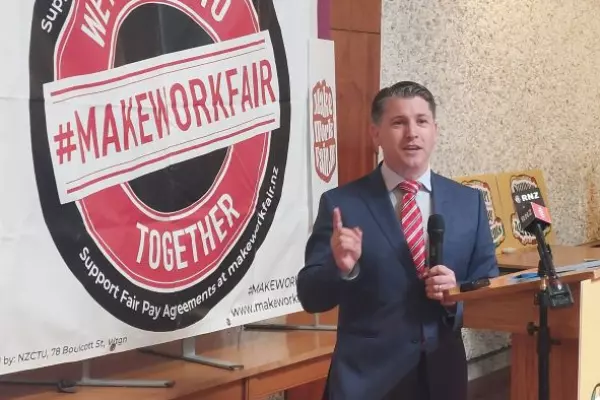Last week Jem Traylen looked at what the experts have to say about the effectiveness of our public service. Today we explore what the public thinks.
When things move fast with covid, they move really fast.
Mid-August saw the prime minister announcing a plan to reopen our borders. Less than a fortnight later, the whole country was back in various levels of lockdown.
Just as the delta strain reared its ugly head, a taxpayer-funded survey began asking 1000 New Zealanders the extent to which they trusted public servants.
The results showed that, as of September, a clear majority of us had kept the faith, with 65% trusting the public service to do what’s right.
However, a closer look at the data suggests an ethnic divide has re-emerged in our team of five million.
The "Kiwis Count" survey is part of an ongoing series sponsored by the Public Service Commission. The results had been showing people’s trust in the public sector to be on a gradual upward trend.
When covid arrived in early 2020, our public service springing into action appears to have given perceptions an even greater boost.
Deputy public service commissioner Hannah Cameron is confident the survey series has revealed a genuine shift in public sentiment.
“While we changed some of our methodology earlier in 2020, the fact that other measures remained relatively constant while the perception score increased, leads us to believe this was not only a methodological anomaly.
“The most obvious reason for the bump is, therefore, the covid-19 context.”
BusinessDesk’s insights adviser Ian Mills, from the customer intelligence firm Perceptive, agrees the results are likely to be robust, with the research methods used for Kiwis Count in line with industry best practice, and the trends similar to other surveys and 2020's election result.
For example, Kantar Public (formerly Colmar Brunton) ran a public sector reputation survey in the early days of the covid response which also saw rising numbers.
It can't last
Michael Macaulay from Wellington’s Victoria University told BusinessDesk trust is always at its highest closest to a disaster, but then dissipates.
“It’s utterly predictable.”
Macaulay, a leading researcher on public integrity, said that two key pillars of trust are consistency and reliability.
As the crisis eases, policy agendas shift, messages change and people start to lose faith.
They start to think: “That's not very reliable, that’s not very credible because now they've changed their mind.
“Last week, we had to wear a mask, this week we don't. Last week we’re level three, but now we're not, even though we've got more cases. What's going on? How can we trust the experts?”
Macaulay foresees a repeat of the mood shift that unfolded after the Christchurch earthquakes. Despite the initial community spirit, the rebuild led to “nothing but rancour and unhappiness and factionalism – because that's what happens.”
What happened to the team of five million?
A demographic breakdown of Kiwis Count data suggests this is happening as we reach the end of 2021.
In NZ before covid, trust in the public sector diverged along ethnic lines, with people from Asia reporting the highest and Pasifika and Māori the lowest.
When covid hit, levels of trust both increased across all ethnicities and converged – suggesting that the team of five million was more than just rhetoric.
But the ethnic gap has widened again. As measured by Kiwis Count, trust levels among Māori are fairly evenly split, although this is actually an improvement on the pre-covid era when a clear majority did not trust public servants to 'do what’s right'.
The survey’s qualitative feedback illustrates the varied experiences of the public service that Māori have.
One respondent who identified as Māori said they were inspired by their experiences of the public services.
“I have not been let down and if anything, it is what makes me want to give back to my own community.”
Another said they very rarely felt they were treated as an individual – “I feel unheard and unhelped”.
“Māori don’t place their trust blindly in government,” said Deb Te Kawa, a consultant and former public servant who is advising BusinessDesk’s public sector project.
She told BusinessDesk that the Kiwi Counts survey has its limitations, and other surveys such as agencies’ own satisfaction surveys probe trust issues more deeply.
Mixed results
Kantar Public’s 2020 report on public sector reputation said many agencies were still giving a poor public impression, with 44% of their clients failing to achieve a good level of positive experience.
Mills said he wasn’t surprised at the mixed results.
“If you talk to a small business owner who's applied for a resurgence grant and suddenly gets the money in their bank account overnight or the same day, in some cases, you go ‘Well, they're doing a great job’.
“If you talk to someone who's trying to come into the country and get a visa sorted at the moment, you might not have such a rosy view of the public service.”
Judging from the Kiwis Count feedback, the main things that appear to weaken public trust are inconsistency and a lack of reliability.
Examples included “conflicting info from same organisations but different people” or “sometimes unreliable with what they say and do.”
Once lost, hard to restore
Trust, once lost, tends to be difficult to restore.
A survey series that dates back to the mid-1980s shows confidence in our public service fell to very low levels sometime after 1985, before gradually recovering in the early 2000s.
Interventionist policies of the late 1970s and early 1980s were rejected by the electorate and followed by market and state sector reforms in the 80s and 90s that also became deeply unpopular. Confidence in the capacity of the state and its servants can be seen (above) to have suffered deeply through this period.
The Helen Clark Labour government, having mined this rich vein of discontent in the 1999 election, sought to restore confidence in the public service, starting with a review of central agencies. With MMP politics also moderating the extent of governments' ability to make major policy changes, confidence in government and public services recovered.
How solid that recovery is will be tested by the current government’s response to the delta phase of covid, which will be the main backdrop as the views of the next 1000 Kiwis are counted, sometime between now and Christmas.
In her role as an adviser on BusinessDesk’s public sector project, Deb Te Kawa draws on her academic work, her research and experience, published information, and emerging research in NZ and overseas. This advice is provided within her obligations of confidence as a former public servant and as a consultant.
Do you know something we should know? Email BusinessDesk's public sector investigation team: [email protected].














